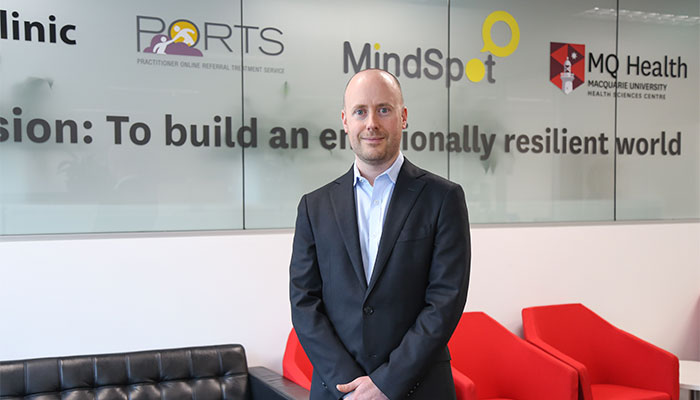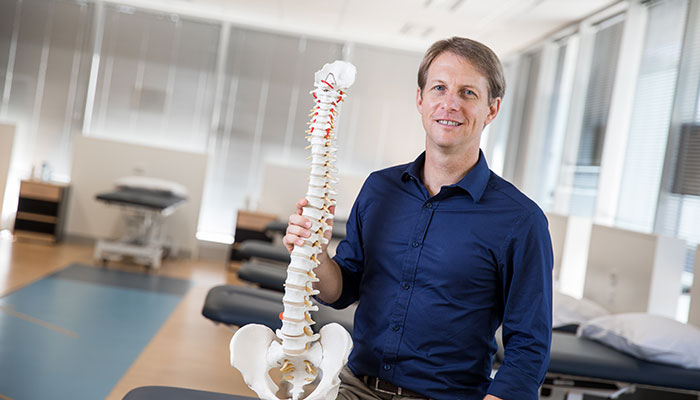Helen* has chronic long-term pain – and she will probably live with it for the rest of her life. Like many people in her situation, Helen’s world shrank more and more as she avoided activities that might make the pain worse.
But a free eight-week online pain course, now available at MQ Health's MindSpot service, has helped Helen reclaim her life.

Coping better: After doing Macquarie University’s free online pain course, most people will expand their activities, research has shown.
“I'm now increasing my social activities as well as taking up my hobbies again which is making me happier and helping me feel more 'normal' again,” she said.
Around 20 per cent of the population will have pain that has lasted longer than three months; and around six per cent will have a persistent pain that interferes with their day-to-day life and continues despite available medication and treatment.
Helen was one of 1600 people who participated in early research trials through Macquarie University’s not-for-profit eCentreClinic. Around 400 of these patients were followed up for two years after doing the online course – and like Helen, most of them found significant life improvements as a result.
Psychology works in pain therapy
Associate Professor Blake Dear is co- Director of Macquarie University’s eCentreClinic, the psychology research unit that came up with the online pain course as part of its role to develop and evaluate treatments for common health conditions.
“We now know that psychological treatment is a really effective therapy for people with chronic pain,” he says.
Leading specialist pain management clinics routinely review a patient’s physical health and medications - and will often also recommend a psychologically-based program, Dear says.
“We have developed an online course that lets people who have chronic pain access that treatment free and without having to travel,” he says.
Long-term outcomes a success
Dear led a research team that evaluated Macquarie University’s internet-delivered pain management program, following up 490 participants after three, 12 and 24 months.
The study found significant clinical improvements in disability, depression, anxiety, and pain levels for all participants after three months, and found that the effects continued two years after the participants had completed the course.
The research trials are now complete and the course has been freely available through the MindSpot clinic, with around 600 people completing the course since 2017.
- Why you should take a guilt-free mental health day
- Strong social ties protect mental health into old age
Before signing up for the eight-week course, people need to have had their pain medically investigated at some stage, Dear says. But the course can occur alongside, or following, medical treatment.
“This program doesn't focus on the pain or where it is coming from or what is causing it,” says Helen. “The focus is on reclaiming your life back by incorporating the things you used to do in your life.”
Living with unsolved causes of pain
Some of the conditions associated with persistent pain include osteoarthritis and rheumatoid arthritis, various diseases such as MS, injuries and pain post-surgery, people who've developed pain as a result of chemotherapy and women with endometriosis.
“Persistent pain occurs with a really wide range of causes; and there’s also a lot of people where there’s no clear medical reason for their persistent pain, but it's definitely there,” Dear says.

Shift in thinking: The course gives sufferers practical coping strategies so they can continue with activities they enjoy.
Feedback from MindSpot patients shows that the program’s useful information, pragmatic strategies and clinician support are helping users get their lives back on track.
“The activity schedule is great as it stops me from overdoing things which then only increases my pain which starts the pain cycle again,” Helen says. “I hadn't realised how much I had cut out of my life unnecessarily, things that made me happy which mostly didn't cause pain.”
Helen says that while she knows pain will be with her for her whole life, the course has shown her that pain doesn’t need to stop her from being active and doing things she enjoys.
“I've already started reclaiming my life,” she says. “I can't wait to lead a more fulfilled life where pain is a minor aspect of my life, not a major aspect.”
Pain usually improves with time – but some people never recover
Most people – and most pain – will get better with time, says Dear – but some people never fully recover from certain injuries or conditions and have pain that lasts and lasts.

Added support: Associate Professor Blake Dear says its important to remember online pain therapy doesn’t replace medical treatment.
“Chronic pain is variously defined as lasting more than three or six months,” says Dear.
“When that pain starts to impact the different areas of people's life, like being able to play with their kids or do things for their family or go to work or even drive, that’s when a pain management program is worth considering.”
There’s misunderstanding that psychological pain therapy is only useful where someone has a mental health issue, Dear says.
When pain impacts different areas of your life like work or driving, a pain management program is worth considering.
“While it’s very common when pain persists over a long period of time and it starts to impact the different areas of people's lives, that they will struggle with their mental health – but that's not true of everyone,” he says.
The program is designed to help people manage the challenges that pain causes in their day to day activities, and can also help them tackle mental health issues that come up.
“The program helps people to understand what's happening in the brain and the body when you have chronic pain, and then teaches very practical skills they can use to do things in their life that are important to them, despite pain.”
Talking to family and friends
After a serious accident, David* now suffers from regional pain syndrome and fibromyalgia and also has crushed vertebrae and scoliosis. These cause him ongoing and severe pain in his back, hips and legs.
Since doing the online course, he says he’s been more able to control his responses. “Now, I don’t go into a spiral of torment when my pain is really bad,” he says. “I’m also taking less breakthrough pain medication.”
David* now has a structured approach to managing pain, which works far better than the piecemeal way he used to cope. “The course helped me explain the reality of living with chronic pain in a way that made it easier for my friends and family to understand,” he says.
Build up over time
People doing the course learn to build up over time so they can do more, Dear says, because often people cut back from things they like to do because of pain.
“We teach people to start to monitor and really examine their thoughts and their thinking processes, because we know from a lot of research that what people are thinking has a big impact on how they handle pain,” he says.
For example – a person with significant back pain may get concerned that they are adding to the damage to their back each time they do something. Those fears will make it much harder for them to manage their pain.
The program is also available to people in remote areas who don’t have good internet access, and who can read printed workbooks instead and have telephone support from a clinician.
“But if you've got chronic pain and cause has been properly investigated, then having those kinds of thoughts that there is this damage can make it that much harder to manage.”
People learn about their internal thinking patterns around pain, and instead of being anxious, learn to pace themselves.
The program involves five lessons spread over eight weeks, with ongoing access to the material for six months after. The free program is funded by the Federal government.
“We know that financial costs are a huge barrier for people who have severe pain,” says Dear.
The clinic has also sent the program to people in remote areas who don’t have good internet access, and who instead can read printed workbooks and have telephone support from a clinician.
Life-changing results
Sarah* has dealt with chronic arthritis pain for many years, and says the course was life-changing.
“When you are living with chronic pain, it can be hard to see any way out of it. This course offers an alternative that is not based on surgery or medication or medical practitioners, but on what you can do yourself to help manage your pain,” she says.
“It may not solve the problem completely, but it empowers you to take control of your pain and be proactive in its management.”
- Faster, Higher, Stronger: Is there a limit to human endurance?
- It’s official: being kind makes you happy and healthy
Many specialist pain clinics have long waiting lists, and it can be challenging for people experiencing chronic pain to travel and to bear the expense of attending them. Online psychological pain management programs allows people to access an important component of pain management more easily.
There are hundreds of stories like those of Helen, David and Sarah – and Blake Dear hopes that, as the clinic becomes better-known, there will be thousands more tales from people who have improved their lives as a result.
*Names and other personal details have been changed.
Associate Professor Blake Dear NHMRC Career Development Fellow, Department of Psychology, Clinical Advisor Macquarie University Clinical Associates (MUCA)



